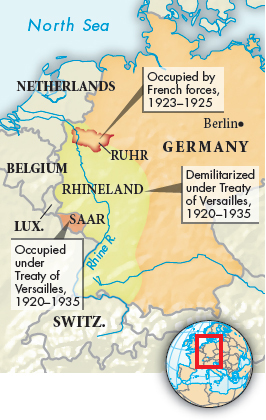Germany and the Western Powers
Nearly all Germans and many other observers immediately and for decades after believed the Versailles treaty represented a harsh dictated peace and should be revised or repudiated as soon as possible. Many right-wing Germans believed there had been no defeat; instead they believed German soldiers had been betrayed by liberals, Marxists, Jews, and other “November criminals” who had surrendered in order to seize power.
Historians have recently begun to reassess the treaty’s terms, however, and many scholars currently view them as relatively reasonable. They argue that much of the German anger toward the Allies was based more on perception than reality. With the collapse of Austria-Hungary, the dissolution of the Ottoman Empire, and the revolution in Russia, Germany emerged from the war an even stronger power in eastern Europe than before, and economically stronger and more populated than France or Great Britain. Moreover, when contrasted with the extremely harsh Treaty of Brest-Litovsk that Germany had forced on Lenin’s Russia, and the peace terms Germany intended to impose on the Allies if they won the war, the Versailles treaty was far from being a vindictive and crippling peace. Had it been, Germany could hardly have become the economic and military juggernaut that it was only twenty years later.
This is not to say, however, that France did not seek some degree of revenge on Germany for both the Franco-Prussian War (see “Bismarck and German Unification” in Chapter 24) and the Great War. Most of the war on the western front had been fought on French soil. The expected reconstruction costs and the amount of war debts owed to the United States were staggering. Thus the French believed that heavy German reparations were an economic necessity that could hold Germany down indefinitely and would enable France to realize its goal of security.
The British soon felt differently. Prewar Germany had been Great Britain’s second-best market, and after the war a healthy, prosperous Germany appeared to be essential to the British economy. In addition, the British were suspicious of France’s army — the largest in Europe — and the British and French were at odds over their League of Nations mandates in the Middle East.

French Occupation of the Ruhr, 1923–1925
While France and Britain drifted in different directions, the Allied reparations commission completed its work, and in 1921 the young German republic — known as the Weimar Republic — made its first reparations payment. Then in 1922, wracked by rapid inflation and political assassinations and motivated by hostility and arrogance as well, the Weimar Republic announced its inability to pay more and proposed a reparations moratorium for three years.
The British were willing to accept a moratorium, but the French were not. Led by their prime minister, Raymond Poincaré (1860–1934), they decided they had to either call Germany’s bluff or see the entire peace settlement dissolve to France’s great disadvantage. So in January 1923 French and Belgian armies occupied the Ruhr district, industrial Germany’s heartland, creating the most serious international crisis of the 1920s.
Strengthened by a wave of patriotism, the German government ordered the people of the Ruhr to stop working and to resist French occupation nonviolently. The French responded by sealing off not only the Ruhr but also the entire Rhineland from the rest of Germany, letting in only enough food to prevent starvation.
By summer 1923 France and Germany were engaged in a great test of wills. French armies could not collect reparations from striking workers at gunpoint. But French occupation was paralyzing Germany and its economy, and the German government was soon forced to print money to pay its bills. Prices soared, and German money rapidly lost all value. Many retired and middle-class people saw their savings wiped out. Many Germans felt betrayed. They hated and blamed the Western governments, their own government, big business, the Jews, the workers, and the Communists for their misfortune.
In August 1923, as the mark’s value fell and political unrest grew throughout Germany, Gustav Stresemann (1878–1929) became German chancellor. Stresemann adopted a compromising attitude. He called off the peaceful resistance campaign in the Ruhr and in October agreed in principle to pay reparations but asked for a re-examination of Germany’s ability to pay. Poincaré accepted. Thus, after five years of hostility and tension, Germany and France, with British and American help, decided to try compromise and cooperation.
